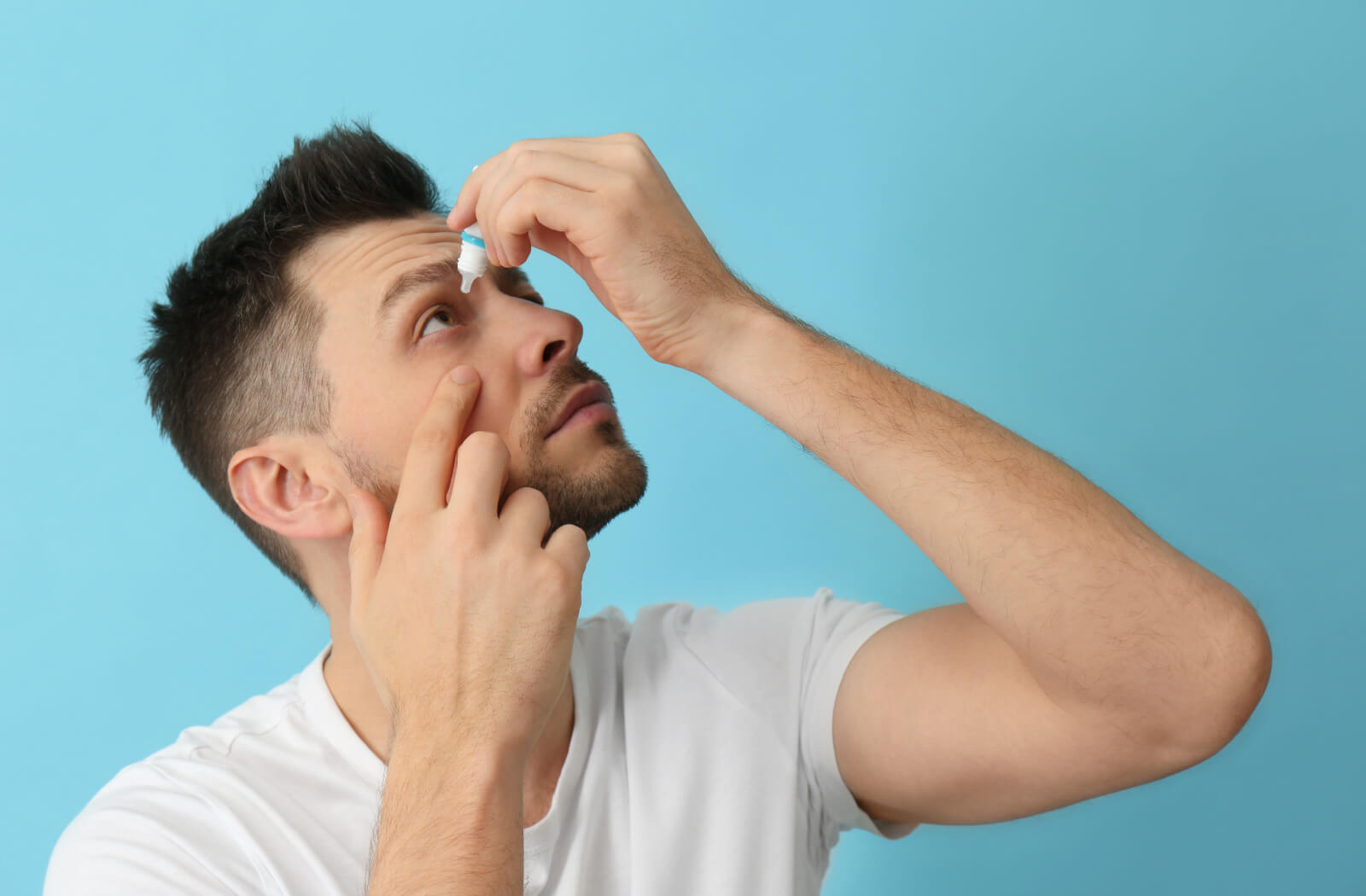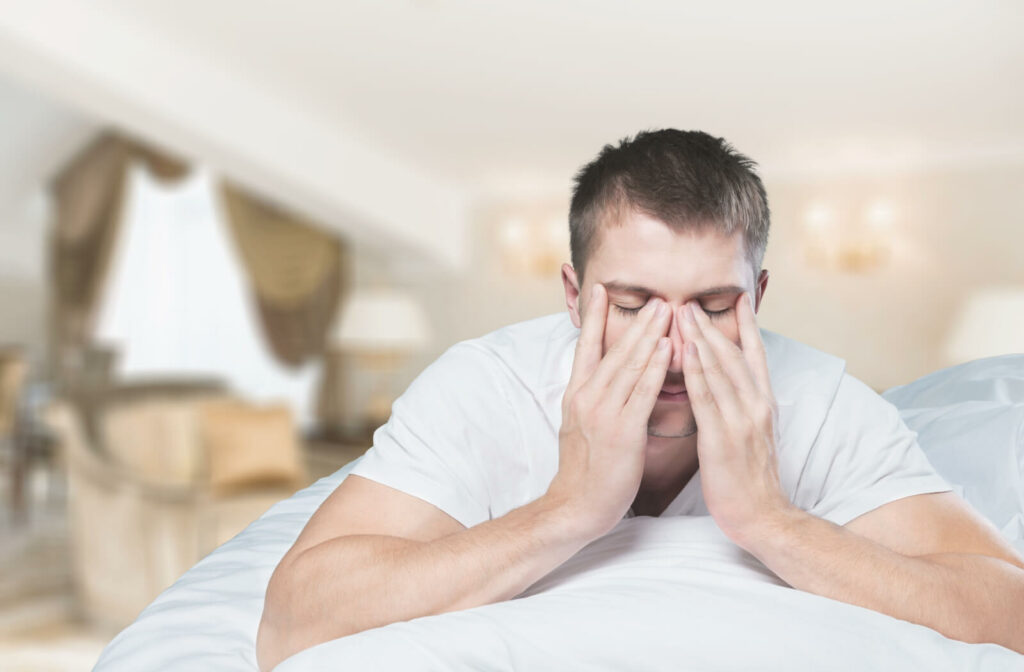Waking up with dry eyes can immediately ruin any feeling of being well-rested after a good night’s sleep. It can also be a sign of an underlying health condition or lifestyle habit that needs to be addressed. Fortunately, you can get relief.
The solutions that can help with morning dry eyes include:
- Using a warm compress
- Using a humidifier
- Using eye drops
- Staying hydrated
- Seeing your eye doctor
Finding an effective solution for dry eyes should start with your eye doctor. If you are frequently waking up with dry eye symptoms, it is a good idea to book an exam with your eye doctor to determine the root cause of your dry eyes.
Why Do I Wake Up with Dry Eyes?
If you are waking up with eyes that feel dry and irritated, there may be a number of culprits to blame. Some common causes of waking with dry eyes include:
- Not fully closing your eyelids during sleep
- Not producing high-quality tears
- Not producing enough tears
- Sleeping in a dry environment
Dry eyes can occur when either your eyes do not produce enough tears or your tears evaporate too quickly. Your tears play an essential role in keeping your eyes hydrated and healthy, and when there is a problem with tear production, it can cause your eyes to become dry and irritated.
Not fully closing your eyes during sleep can cause the tear film on your eyes to quickly evaporate, resulting in dry eyes. If you are not fully closing your eyelids during sleep, you may have nocturnal lagophthalmos. This condition can be caused by things like trauma to your skull or jaw, an injury to your cerebellar artery, or Bell’s palsy. Nocturnal lagophthalmos can be diagnosed with a visit to your eye doctor and may require specialized treatment.
There is a wide range of additional health, lifestyle, and environmental factors that may cause you to develop dry eyes. Things like age, hormonal changes, certain medical conditions and medications can all cause changes to your tears that result in dry eyes. Environmental factors such as living in a dry environment or spending a lot of time in front of a computer can also contribute to dry eyes.
What Are the Symptoms of Dry Eyes?
Dry eyes can cause a range of uncomfortable symptoms, including:
- Redness
- Itchiness or burning
- Foreign object sensations
- Watery eyes
- Blurred vision
- Sensitivity to light
If you are experiencing any of the symptoms above, it might be time to discuss dry eyes with your eye doctor. Dry eye is a chronic condition that may require ongoing treatment to manage your symptoms. Your eye doctor can work with you to develop an effective treatment plan with your specific needs in mind.

5 Solutions for Waking Up with Dry Eyes
Finding effective relief from dry eyes can start right at home. The 5 solutions below can help you manage dry eyes in the morning and throughout the day.
Use a Warm Compress
Using a warm compress can be a great way to promote healthy tear production. Dry eyes caused by low-quality tear production may be related to blockages in your eye’s important tear glands, and the heat from a warm compress can help melt away these blockages.
A warm compress can be used at home and at your eye doctor’s office. To use a warm compress, simply soak a clean cloth in warm water and place it over your eyes for 5-10 minutes. You can also use a specially designed eye mask for dry eye, which can be heated in your microwave.
Use a Humidifier
Dry air can contribute to dry eyes, particularly in the cold winter months. Using a humidifier in your bedroom at night can help add moisture to the air, which can help minimize overnight dryness.
Making additional environmental changes, such as reducing potential irritants like smoke or dust, can also help to alleviate irritation and dry eye symptoms.
Use Eye Drops
If you have dry eyes, it may be time to introduce eye drops into your eye care routine. Eye drops, or artificial tears, can help to replenish your eyes with much-needed moisture and alleviate dry eye symptoms.
Using eye drops before you go to bed and first thing in the morning may be helpful in keeping your eyes feeling hydrated and healthy. Eye drops can also be a handy on-the-go treatment to use throughout the day for instances when you may experience irritation.
Stay Hydrated
Drinking plenty of water and eating a balanced diet are important for maintaining overall health, and eye health is no exception. Staying well hydrated throughout the day can help promote important body functions, including healthy tear production.
Additionally, eating a balanced diet rich in omega-3 fatty acids can help promote healthy tear production and support your overall eye health.
See an Eye Doctor
While at-home treatments and lifestyle changes may work for some individuals, the solutions that we discussed above may not work for everyone. If you’re experiencing persistent dry eyes, it’s important to see your eye doctor. They can help you determine the underlying cause of your dry eye symptoms and recommend appropriate treatment options.
In some cases, dry eye can be a sign of an underlying health condition, such as an autoimmune disorder or a thyroid problem. If this is the case, you may need to treat the underlying health condition in order to find lasting relief.
Find Effective Treatment for Dry Eyes
If you experience dry eyes, you are not alone. An estimated 6 million Canadians suffer from dry eye disease. The path to relief from dry eye symptoms starts with a visit to your eye doctor. Book your appointment with the team at One Vision Eyecare today!




